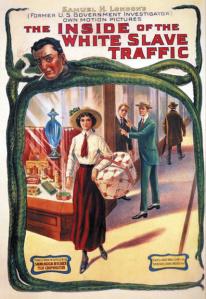 With Backpage in the news so much, and various government actors vomiting out so many egregious lies about it, I thought it might be a good idea to recap how this whole shitshow developed from its roots in the previous “sex trafficking” moral panic to the present political circus. See, while the politicians want you to believe that Backpage is some sort of magical pimp machine the likes of which has never been seen before, the truth is that Backpage ads are the end result of a slow and steady progression of advertising starting roughly a century ago, just after prostitution was criminalized in the US at the height of the last go-round of hysteria over “sex trafficking” (or as it was called then, “white slavery”). Once brothels could no longer operate openly, escort services appeared, while some women chose to frequent hotels and such and others preferred to take out personal ads in newspapers. Once the alternative weeklies appeared in the 1960s, the latter approach became far more popular; escorts were able to be more blunt than they could in major newspapers, though not remotely as blatant as they later became once those weeklies went online. Even the name “Backpage” is a tribute to the site’s origin as an online version of the back pages of alt-weeklies, where the classified ads (including escort ads) were located. In fact, the only important differences between the online version and its print ancestors are those directly related to the differences between the online medium and the print medium, such as ease of access and speed of both posting and reply (ask a whore who worked prior to the late ’90s about going to one’s PO Box to pick up actual paper letters from clients answering one’s ad, requesting appointments days or weeks in the future).
With Backpage in the news so much, and various government actors vomiting out so many egregious lies about it, I thought it might be a good idea to recap how this whole shitshow developed from its roots in the previous “sex trafficking” moral panic to the present political circus. See, while the politicians want you to believe that Backpage is some sort of magical pimp machine the likes of which has never been seen before, the truth is that Backpage ads are the end result of a slow and steady progression of advertising starting roughly a century ago, just after prostitution was criminalized in the US at the height of the last go-round of hysteria over “sex trafficking” (or as it was called then, “white slavery”). Once brothels could no longer operate openly, escort services appeared, while some women chose to frequent hotels and such and others preferred to take out personal ads in newspapers. Once the alternative weeklies appeared in the 1960s, the latter approach became far more popular; escorts were able to be more blunt than they could in major newspapers, though not remotely as blatant as they later became once those weeklies went online. Even the name “Backpage” is a tribute to the site’s origin as an online version of the back pages of alt-weeklies, where the classified ads (including escort ads) were located. In fact, the only important differences between the online version and its print ancestors are those directly related to the differences between the online medium and the print medium, such as ease of access and speed of both posting and reply (ask a whore who worked prior to the late ’90s about going to one’s PO Box to pick up actual paper letters from clients answering one’s ad, requesting appointments days or weeks in the future).
So when Craigslist first appeared in 1996 as an online classified ad site, it was a foregone conclusion that whores would post ads in its classified and massage sections, just as they had in newspaper sections. It wasn’t any kind of “revolution”; it just sped things up and made them more efficient. But whenever a new technology is involved, you can be absolutely sure the Puritans and Luddites will insist that it’s the source of all manner of new evils, and that it will surely bring about the end of civilization (usually by corrupting women and harming children, naturally). It took them over ten years, however; though Craigslist had a dedicated “erotic services” section by 2002 (I’m not sure of the exact date it was added), the “sex trafficking” fetishists, at that time far less numerous and vociferous than they are now, did not really begin to take note of it until sometime after 2005. That was the year bureaucrats from the San Francisco Department of Public Health embarked on a campaign to blame the site’s personals section for a rise in syphilis among gay men, using the typical government argument that adults are so stupid and passive that they need to be “encouraged” or “facilitated” by some corporation or communications medium to do things like have sex. The blame-game seemed to attract the attention of the “sex trafficking” fetishists, and by the following year they were starting to put pressure in the site to “do something” about their favorite imaginary problem. A group of 40 state attorneys general demanded that Craigslist facilitate pigs’ attempts to arrest sex workers (under guise of “stopping “trafficking”, naturally) and the site responded by requiring a working phone number and charging a fee to post in the erotic services section (to keep underage people out). Of course, that wasn’t enough; the following year Craigslist renamed the section to “adult services” while prohibitionists blathered about how much money the company was making from the fee they had forced it to charge. Finally, in 2010 the site shuttered the section, putting up a “censored” bar over the link to it, and advertisers either migrated to Backpage (founded in 2004 specifically as a competitor to Craigslist) or went back to advertising in the personals & massage sections as they did before the “erotic services” category was established.
 Drunk with their victory, the prohibitionists immediately turned to Backpage; within weeks of Craigslist’s defeat they sent a similar letter to the one they had sent Craigslist, no doubt expecting a similar reaction. Instead, they got a fight which has gone on for over six years, with Backpage winning at every turn for the simple reason that the government’s demands are blatantly unconstitutional. But the evil don’t stop being evil merely because they’re wrong; faced with repeated defeats in their attempts to take legal action against the company, government prohibitionists decided to simply take illegal actions instead, ranging from Tom Dart’s threats against credit card companies to Senate “hearings” of the same sort previously held to intimidate moviemakers, comic book publishers and the music industry. Then in October, California attorney general Kamala Harris upped the ante by committing the blatantly criminal act of arresting the CEO and both owners of Backpage and filing charges against them that she absolutely knew were illegal for her to file. Naturally, a judge slapped her down, and she replied by filing even more ridiculous charges, shitting all over the dying protection against double jeopardy in her quest to be a hero to fanatics. Exhausted and facing the prospect of an infinite succession of similar nuisance charges from criminal tyrants the courts seem unwilling to charge or even rein in, Backpage finally followed in Craigslist’s footsteps and censored its adult ads one week ago today.
Drunk with their victory, the prohibitionists immediately turned to Backpage; within weeks of Craigslist’s defeat they sent a similar letter to the one they had sent Craigslist, no doubt expecting a similar reaction. Instead, they got a fight which has gone on for over six years, with Backpage winning at every turn for the simple reason that the government’s demands are blatantly unconstitutional. But the evil don’t stop being evil merely because they’re wrong; faced with repeated defeats in their attempts to take legal action against the company, government prohibitionists decided to simply take illegal actions instead, ranging from Tom Dart’s threats against credit card companies to Senate “hearings” of the same sort previously held to intimidate moviemakers, comic book publishers and the music industry. Then in October, California attorney general Kamala Harris upped the ante by committing the blatantly criminal act of arresting the CEO and both owners of Backpage and filing charges against them that she absolutely knew were illegal for her to file. Naturally, a judge slapped her down, and she replied by filing even more ridiculous charges, shitting all over the dying protection against double jeopardy in her quest to be a hero to fanatics. Exhausted and facing the prospect of an infinite succession of similar nuisance charges from criminal tyrants the courts seem unwilling to charge or even rein in, Backpage finally followed in Craigslist’s footsteps and censored its adult ads one week ago today.
But while the mainstream reaction to Craigslist’s defeat was largely a collective yawn, the same is not true this time around. While Craigslist’s resistance and eventual surrender was generally conducted rather quietly, the war on Backpage has been extremely noisy and impossible to ignore; as a result there have been many articles about it already. The best of these, as usual, is by Elizabeth Nolan Brown; David Meyer Lindenberg of Fault Lines and Mike Ludwig of Truthout, both strong and dependable allies, also wrote on the topic, and Alison Bass ridiculed Nicholas Kristof’s predictably-ridiculous take on the subject. Sex workers are coming together to help each other find alternative advertising resources, and other groups such as free-speech advocates and anarchists are chiming in as well. Backpage has vowed to continue the fight, and I certainly hope they do, because as soon as they stop struggling the prohibitionists will need to find another advertising site to turn into a monster. Their campaign of eternal outrage needs a target for its hate, or else it means the end of all the accumulation of money and power which is the true aim of this ugly anti-sex crusade.
